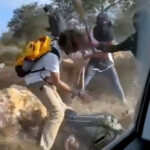(RNS) — Ask most Jews of a certain generation about Rabbi Arthur Waskow and their eyes light up. His name evokes a particular kind of Jewish electricity — the prophetic spark that leaps from text to street, from Seder table to sit-in. For more than half a century, Waskow embodied the conviction that Judaism is not an heirloom but a power source — that Torah was never meant to sit quietly in the ark.
He died this week at the age of 92, and for many of us, his memory elicits a smile.
Born in Baltimore in 1933, Waskow earned a doctorate in American history from the University of Wisconsin-Madison and worked in Washington, D.C., as a policy analyst and legislative assistant. His early career in civil rights, disarmament and anti-war advocacy revealed an instinct that would shape everything that followed: that moral questions are never abstract, and that silence in the face of injustice is a form of idolatry.
In 1969, Waskow produced the work that announced his arrival on the Jewish stage, “The Freedom Seder.” Looking back in 2018 on that experience, he wrote:
On April 4, 1968, the transformation of my life began with the volcanic news that Dr. Martin Luther King had been killed. Just a week later — a week of upheaval in my city and our country — the volcano of transformation entered within me, minutes before Passover began.
Passover? Why was that suddenly so shattering? I had always taken the Seder seriously, but I was astounded to feel this moment shaking me to my core. Why was this Passover different from any other Passover?
I was 34 years old, living in Washington D.C. and working for peace and racial justice. I had grown up in a Jewish neighborhood in Baltimore with a strong sense that community, neighborhood itself, was warmly Jewish; that freedom and justice were profoundly, hotly “Jewish and beyond” — and that Jewish religion was boring boiler-plate.
Except for celebrating the Passover Seder, which brought family, community, freedom, and justice around the same dinner table, I had long abandoned the rhythms of Jewish religion.
So as a grown-up I had found my community not in any Jewish neighborhood but in the network of organizers for racial justice, peace in Vietnam, and world-wide nuclear disarmament — a network centered in the Institute for Policy Studies, where I had been one of the founding fellows in 1963.
And then Dr. King’s death and its aftermath in Washington undid me and rebirthed me.
“The Freedom Seder” told a generation that the Passover table was not a museum but a laboratory, that true to its plural Hebrew form (Mitzrayim) Egypt was not only then, but now. It made liberation the center of Jewish religious vocabulary, and it gave Jewish activists, women and Black and brown allies permission to see their own stories within ours.
In 1983, Waskow founded the Shalom Center, a hub of Jewish prophetic activism. From nuclear disarmament to racial justice, from LGBTQ inclusion to Middle East peace, it was a gathering place for the faithful restless. Waskow was their teacher and their moral alarm clock. For Waskow, God was not an abstraction, but an accomplice in repair.
That repair was, truly, tikkun olam, repairing the world itself. His theology of eco-Judaism, rooted in Torah’s call to “till and tend” the Earth, became a movement.
I read everything Waskow wrote, and I lived with his words, even when I did not agree with him – and we had many loving conversations about that. His prose could flirt with utopianism, earnest and prophetically impatient. But he loved the Jewish people, and that was the point. He wanted both Jews and Judaism to matter, not merely to survive.
What did I love most about him? His audacity. Decades before this column, Martini Judaism, was born, he shook and stirred us. He believed both Jews and Judaism should be subversive and morally disruptive.
I write this as a Reform rabbi, a denizen of a movement that has styled itself as “prophetic Judaism.” Waskow looked the part — how we might imagine the prophet Amos. It wasn’t just appearances; he absolutely channeled the prophet. At a time when the haftarah, the prophetic message, was an afterthought in the synagogue’s scriptural reading, Waskow almost single-handedly resurrected that temperament. When he spoke of Pharaoh, it was not allegory. He meant Exxon, militarism, racism and the system itself.
And yet, for all the sharpness of his critique, his was not a politics of contempt. He always did it with the sparkle of love in his eyes.
Of the architect Sir Christopher Wren, it was said (because of his design of St. Paul’s Cathedral in London): “If you seek his monument, look around you.” To see Waskow’s monuments, look at the Jewish Renewal movement, at Judaism’s continued involvement with environmental issues, at his principled stance against nuclear weapons at a time when few were paying attention, at new ways of looking at sexuality and at new/old ways of speaking of, and speaking to, God.
All of it was Waskow, and none of it could have existed without him.
His numerous books that will always have a home on my bookshelf include “Godwrestling” (1987), one of the first books to teach me the metaphor of wrestling — with God and texts themselves. “Seasons of Our Joy: A Modern Guide to the Jewish Holidays” reinterpreted the festival cycle. And “Down To Earth Judaism: Food, Money, Sex, and the Rest of Life” rejected the compartmentalization of Jewish life. In everything he did, he reimagined.
Waskow reminded us that Judaism is not only about continuity, but conscience. It’s not only about memory, but moral imagination. To be Jewish, in his vision, is to be forever mid-Exodus — always leaving something unjust behind, always moving toward a freer horizon. In that sense, his theology is unfinished business. It waits for the next generation to carry forward, to balance passion with patience, ecstasy with ethics, dream with discipline.
That is Waskow’s enduring legacy, and his challenge. He showed us how to turn faith into fire. Our task is to make sure that, in the heat of that fire, we do not lose the light.
Right about now, he is meeting God. I only hope that God is ready for that encounter, and that Waskow will go easy on the Holy One.



